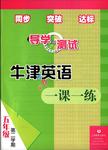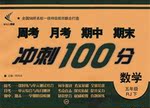题目内容
— It’ll take at least two hours to do this!
— Oh, _______! I could do it in 20 minutes.
A. hi, there B. cheer up
C. come on D. hard to say
C
【解析】
试题分析:考察对话习惯用语。该对话意思:----做这个至少要花两个小时。---啊,来吧,我可以在20分钟内做完。结合各个选项 A. hi, there嗨,这里;B. cheer up高兴点;C. come on来吧; D. hard to say难说。结合语境,故选C
考点:考察对话习惯用语。

练习册系列答案
 导学与测试系列答案
导学与测试系列答案 新非凡教辅冲刺100分系列答案
新非凡教辅冲刺100分系列答案
相关题目
